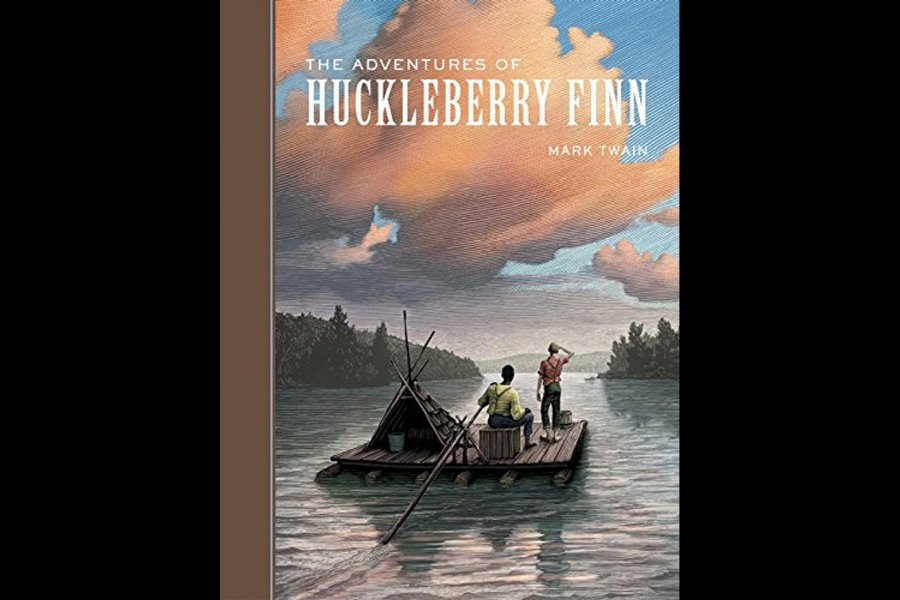Book: JAMES
Author: Percival Everett
Published by: Mantle
Price: Rs 750
Adventures of Huckleberry Finn, first published in 1884, leapt to the forefront and quickly joined the canon of children’s literature. Mark Twain wrote the novel as a direct sequel to The Adventures of Tom Sawyer and the book gained popularity predominantly because of its plot that dealt with the narrative told in the voice of a young boy yearning for adventure. And an adventure it is: young Huck is compelled to fake his own death and escape after his father tries to kill him and, during his flight, encounters the runaway Jim, a slave belonging to Miss Watson, the old woman who adopted Huck. Jim is running away because he overheard that his mistress was contemplating selling him.
Percival Everett, a well-established author with over 20 novels of different genres under his belt, writes James from the perspective of Jim, Huck’s companion. Everett also moves the story a couple of decades forward so that he can incorporate the onset of the war called “north gin the south” by Huck. While Everett retains the frame of Twain’s narrative, the voice of Jim, a stark, pedantic contrast to that of Huckleberry — boyish and comic — brings to the front the unforgettable pain and the suffering of hundreds of slaves whose voices were silent. Twain’s novel stood out for its brutal satire on racism and his representation of the local vernacular of the southern states of North America. Everett presents this very vernacular as a ruse used by the slaves so that they appear simple and unable to employ efficiently the language of the masters. Jim and his companions are able to fluently use English and only resort to this vernacular in the presence of white people. This ruse becomes a powerful tool that helps the reader navigate the reality of the situation.
Jim can read and write, abilities that make him far more threatening to the white man than his strong arms and robust build. He converses with Voltaire and Locke in his dreams and quickly dismisses the Bible as a tool used by white men to force their slaves into fearful submission. Even though Everett keeps us tethered loosely to the original story, inserting incidents like Jim finding the floating house, Huck and Jim getting separated in the fog, their encounter with the King and the Duke, James is truly the tale of the adventures of Jim. His years of slavery, possibly from birth, have given him the common sense to keep himself as invisible as possible. This works in his favour at least for the first part of the novel as he manages to stay out of trouble’s way. Jim’s primary concern is for his family. What worries him endlessly is how he will buy their freedom as a black man, whether free or enslaved, is incapable of owning property. This bitter truth is underlined by the lynching of Young George, a hapless slave, who steals a pencil stub for Jim to write with and pays the price.
Twain’s era was that of the songbook. It is a known fact that the novelist hugely enjoyed Blackface performance. Everett masterfully incorporates the episode of the Virginia Minstrels, a group of singers who take on Jim as they were short of a tenor. Jim, who ended up in the hold of the blacksmith, Wiley, is spotted by Daniel Decatur Emmett, the leader of the troupe. While Emmett says that he does not believe in slavery, he nevertheless buys Jim from Wiley, with the bill of sale as proof, and professes that Jim only need be with him till he pays off his value. The irony is scathing when Emmett, as reported by Norman, curses the “darkies” upon discovering Jim’s escape.
One of the interesting characters among those that Jim encounters is Norman. He is light-skinned but insists he is a slave. His skin is as white as that of the white man which makes him a convenient daylight companion for Jim. They play master and slave, cooking up a plan of Norman selling Jim and then Jim escaping and them redoing the act to gather enough money to free their respective families. Though Norman remains a faithful companion to Jim, when it comes to Jim facing a sad choice, he is compelled to choose Huck. This decision of Jim’s reveals a startling truth that throws Huck off completely and takes us into a new extension of Twain’s tale that had ended far earlier with the happy union of Tom and Huck and the remarkable freedom of Jim granted by Miss Watson before her death.
It is obvious why Everett takes the narrative towards a darker conclusion. Freedom for the slaves was as elusive as was education or wages. The utopian ending fashioned by Twain buries the brutality and the torture the slaves had to endure. Episodes like the ones with Sammy, Young George and Katie are like jabs that awaken the readers to the harshness of their reality. The quiet Jim, stewing in anger and with vengeance, slowly sheds his guise of the subdued slave and owns, with calm but fearsome command, all the allegations that have built up against him. Huckleberry’s narrative flowed like the river, Mississippi, happy and tripping along over pebbles and sandy beaches. Jim’s narrative is also like the river, but it sounds like the dark storms that crowd over it. It suffocates like the muddy waters in its depth and it pulls like the strong currents that flow through it. From amongst the muck, the storm and the tide emerges James, “just James”, who threatens to rend through the veil of fear and rewrite black history.










